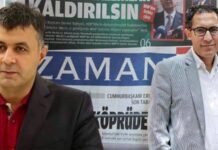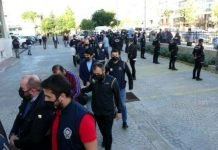Turkey’s academic community is severely paralyzed due to a government crackdown on scholars in the last four years, according to the New York-based Scholars at Risk’s (SAR) academic freedom report “Free to Think 2020.”
The report, which was published on Wednesday, shows how deliberate attacks by Turkish authorities on university communities have significantly weakened the country’s ability to produce free thinking and compete in the global higher education arena.
In a global initiative SAR analyzed 341 reported attacks, including killings, violence, disappearances, imprisonments, prosecutions, losses of position and travel restrictions, against higher education communities in 58 countries that occurred between Sept. 1, 2019, and Aug. 31, 2020.
“For the fifth consecutive year, SAR has reported a high volume of attacks by Turkish authorities against the country’s higher education communities, directly impacting scholars, students, and staff,” the report said.
“Free to Think 2020” draws on data from SAR’s Academic Freedom Monitoring Project and identifies trends related to attacks on higher education communities, including wrongful imprisonments and prosecutions of scholars, restrictions on academic travel, deployed most prominently by authorities in Israel, Turkey, and the United States; and legislative and administrative threats to university autonomy, including in Brazil, Ghana, Poland, Romania, Russia and Turkey.
SAR’s Academic Freedom Monitoring Project identifies and reports attacks on higher education in order to protect vulnerable scholars and students, hold perpetrators accountable and prevent future violations.
The report provides detailed analysis of pressures on national and regional higher education communities, including continued challenges to Turkey’s academic community following a four-year crackdown and purge of scholars. According to the report Turkey’s national level of respect for academic freedom dropped steeply after 2014 and reached its lowest point of the decade.
According to the report, “Turkey’s academic community is now severely paralyzed, while thousands of dismissed academics still await justice, facing lengthy delays in appealing their dismissals and unable to work in academia.”
Turkey started a massive purge of academics in 2016. In the wake of renewed clashes between Turkey’s security forces and the outlawed Kurdistan Workers’ Party (PKK), a group of academics known as “Academics for Peace” signed a declaration titled “We Will Not be a Party to This Crime,” demanding that the Turkish government put an end to blockades and curfews in Kurdish towns and avoid targeting civilians in the conflict. It was signed by more than 2,000 intellectuals from both inside and outside Turkey, including prominent thinkers Noam Chomsky and Immanuel Wallerstein.
The declaration frustrated Turkish President Recep Tayyip Erdoğan and the Justice and Development Party (AKP) government, leading to retribution against the academics. Some of the insults Erdoğan used against them included “so-called intellectuals,” “a flock called intellectuals,” “traitors” and “rough copies of intellectuals.”
The PKK is an armed secessionist group listed as a terrorist organization by Turkey, the European Union and the United States.
Many signatories of the declaration were prosecuted on terrorism-related charges. During the state of emergency that was declared following a coup attempt in July 2016, the Turkish government dismissed hundreds of academics who had signed the declaration using emergency decree-laws.
During the same period the Turkish government also targeted academics who were allegedly linked to the Gülen movement, a faith-based group inspired by Muslim cleric Fethullah Gülen. The government accuses the movement of masterminding the coup attempt in July 2016 and labels it a terrorist organization. Gülen and the movement strongly deny involvement in the coup attempt or any terrorist activity. Over 5,700 academics have been dismissed since the abortive putsch.
According to the report, dismissed academics face immense difficulties in their daily lives, working mostly part-time and piecework jobs, often with no relation to their academic expertise. Having been dismissed from the civil service, they are banned from academic employment for life. “Many of them have been denied a job at least once after employers reviewed social security records reflecting their dismissal by emergency decree (60%). Apparently, employers fear facing pressure themselves if they were to hire a dismissed person. The “stigma” is thus real and visible.”
As a result, the rate of mental and emotional disorders among dismissed academics is much higher than that of the same age groups within the general population, according to the report. Of those who consulted with a medical institution, many were diagnosed with depression (47 percent), anxiety disorder (31 percent) and posttraumatic stress disorder (21 percent).
The report also underlines that in Turkey, “many higher education personnel and civil servants remain unable to travel internationally after the government canceled their passports for expressive activity and alleged affiliations with groups disfavored by the government.”
In its report SAR urges state authorities and higher education leaders “to suspend and reverse actions taken against Turkish higher education institutions and personnel, ensure due process, consistent with international human rights standards, and restore and strengthen institutional autonomy.”
















